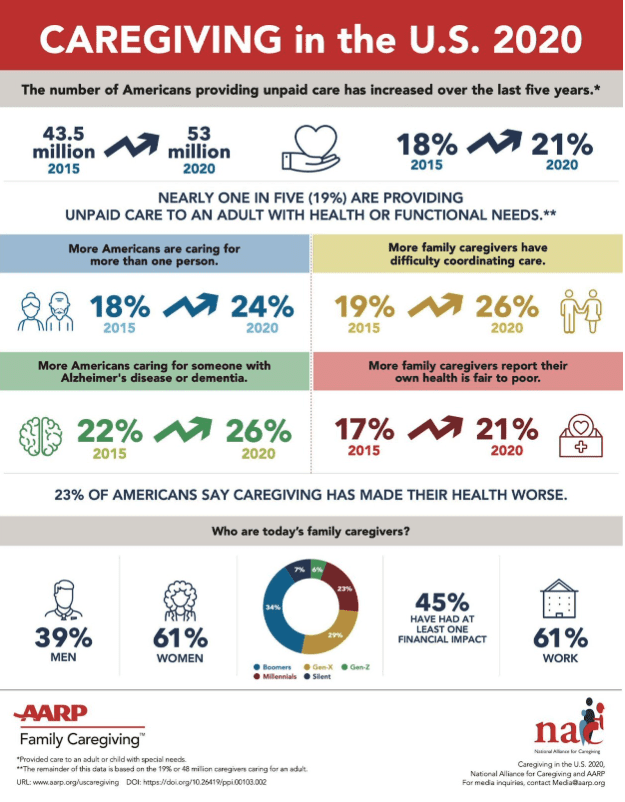According to The National Alliance for Caregiving (NAC) and AARP, 1 in 5 Americans are caregivers. As more and more of our population continues to age, the need for caregiving is creating a sandwich situation for people caught between care of their parents and care of their children. To understand how this is affecting adults, typically women more than men, we spoke with Dr. Kelly Kennedy, the owner of Modern Wellness Family Counseling.
Kennedy supports families and has extensive experience in traditional counseling for adolescents and adults; she has particular expertise on women in leadership positions who struggle with anxiety, perfectionism, and time management.
“This sandwich generation is a challenge.” Kennedy said. No matter where you are in your caregiving – maybe you waited to have kids at an older age and now manage young children and aging parents’ needs, or perhaps you are a parent of older children who are heavily scheduled – fitting anything additional in can feel insurmountable.
The term “sandwich generation” refers to women and men who find themselves in the middle, caught between caring for their aging parents and supporting their own children. These people often must bear significant responsibilities and challenges as they navigate the needs of two different generations.
This responsibility carries a real financial burden, along with a mastery of time management skills, as juggling the needs of children and aging parents can be demanding, requiring careful time management and flexibility. Those in the sandwich generation often find themselves shuttling between school events, doctor’s appointments, and assisting their parents with household chores, medical visits, and daily tasks. Medical care coordination alone – researching and acting as mediators between doctors, researching and making healthcare decisions for parents while also advocating for their children’s educational and developmental needs – is a huge challenge.
“We typically see women taking this on more often, and the cognitive and emotional load is huge when there are so many factors and real care needs that women have to manage.” Kennedy said. As we know, beyond caregiving, women typically bear the brunt of emotional labor, keeping families connected and the social fabric together. Women are the ones more likely to feel guilty about not calling their Nana. And what makes this issue even stickier is that they have a right to be worried.
The loneliness epidemic is real and serious, and checking in on your family members is critically important. There is evidence that loneliness has a real impact on your health, and the physical consequences of poor connection can be devastating.
Sharing the burden is helpful, but typically in a set of siblings, there is one person who takes the lead. Practically, that makes sense, in that there needs to be a designated decision-maker for most things, a first call. Typically, it is the sibling that logistically lives closer to the family member in need of care.
Kennedy recommends that those who are not the lead caregiver can still help by just stepping up. Help manage bills if you can’t provide your presence. Do more in the background. If you have young children and can’t provide the support in person, take on something that you can do on your own time. Research long-term care options, or just make regular phone calls and visits to bring personal connection to the parent or loved one you care for.
Fortunately, there are more ways and more options to get the help you need.
“The hopeful thing I see now is we are using apps to send groceries, in home care, and to take advantage of innovative adult day centers, where women and men can have a place to go with care and activities. There are even tours designed for older people,” Kennedy said. She highlighted the practical solutions that can make the responsibility of managing care easier. There are a lot of things out there that can help your parents continue to enjoy a high quality of life while having the necessary care they need, and allow you to manage your schedule.
While the sandwich generation faces unique challenges, it’s essential to recognize that caregiving can also be a meaningful and rewarding experience. By seeking support, practicing self-care, and embracing open communication, you can navigate the complexities of caring for both your children and aging parents while finding a balance that works for your families and yourself.



